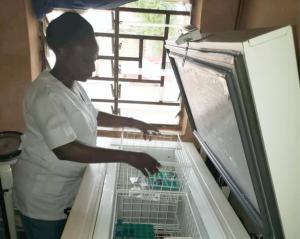Government urges private and public health facilities to enforce best practices in vaccine storage and management
Lafia, 20 September 2019 - In a primary healthcare centre in the suburbs of Nasarawa State, Nurse Ayenajeh Sasefu carefully arranges vaccines for various diseases adhering to Government guidelines for vaccine management.
“These vaccines are very sensitive”, she says, as she arranges the different vaccines according to their temperature sensitivity within the cold storage equipment. “We usually store these vaccines with caution because if not properly handled, its potency can be reduced”, she adds.
True to Ayenajeh’s words, there are few immunization issues more important than the appropriate storage and handling of vaccines. According to the World Health Organization (WHO), the success of efforts against vaccine-preventable diseases (VPDs) is largely attributed to proper storage and handling of vaccines. Some vaccines exposed to temperatures outside the recommended ranges can have reduced effectiveness and protection. Storage and handling errors pose great economic consequences as they can cost millions for replacement and lead to wastage of the vaccines.
The 2018 WHO cold chain inventory assessment reveals that about 60% of wards in Nigeria are not equipped with active cold chain equipment and that 58% of immunization sites are without electricity. Government in collaboration with its development partners, such as WHO, UNICEF and CHAI, is making efforts to ensure each ward have a minimum of 1 functional cold chain equipment through the Cold Chain Equipment Optimization Platform as provided by the Global Alliance for Vaccine and Immunization (Gavi). This will go a long way in improving access to potent, safe and free vaccines to communities across 36 states and the FCT.
“As Government, we always encourage both private and public health workers to handle vaccines as per WHO recommended guidelines,” says Hajiya Kubura Iyabo Daradara, Director Logistics and Health Commodities at the National primary HealthCare Development Agency (NPHCDA).
“It is better not to vaccinate than to administer a dose of vaccine that has been mishandled. Vaccine management including proper storage and handling procedures must be the basis on which good immunization practices are built”, she adds.
Setting standards for proper vaccine management
As part of its efforts in setting standards, WHO is supporting the Nigerian Government to conduct Effective Vaccine Management Assessment (EVMA) and facilitate the development of continuous improvement plans (cIPs) as well as tracking implementations. The last EVMA conducted was in 2017 which places the country at geometric mean score of 69% against the 80% bench mark across 9 set of criteria (Vaccine arrival, Temperature, Storage capacity, Building/equipment/transport, Maintenance, Stock management, Distribution, Vaccine management, Distribution, Vaccine management, and Information/supportive functions). This shows significant increase over the 52% achieved in 2010, though only marginal improvement compared to 67% achieved in 2014.
Dr Ahmad Isah Muhammad, WHO National Immunization Supply Chain and Logistics Officer says “WHO has been supporting the Government of Nigeria in conducting supportive supervision using its field staff, targeted at building the capacity of frontline health workers and encouraging better vaccine management practices”.
During the supportive supervision, some of the activities include: Assessment of cold chain equipment (CCE) functionality, facilitating conduct of planned preventive maintenance for CCEs, regular temperature monitoring and charting, proper vaccine storage, shake test and practice of multi-dose open vial policy. An average of 1202 facilities are visited per month.
Dr Muhammad however, states that “Government needs to fast track the implementation of cIP at all levels, invest in capacity building efforts of staff towards good vaccine management, ensure repair of broken down CCEs and strengthen performance management and accountability on vaccine storage and handling. WHO will continue to provide technical support to the Government of Nigeria to ensure standard vaccine management practices through capacity building, mentorship and provision of evidence based policy options.”



